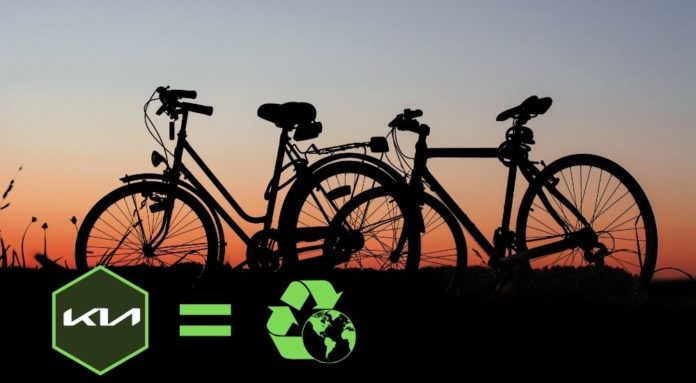While largely devoid of any concrete changes or commitments on a governmental level, the recent COP26 climate conference has given some auto manufacturers a renewed interest in pursuing green initiatives. These brands have been hard at work in the R&D labs, busily envisioning a greener automotive future that drivers might soon see reflected on the lots of Kia dealers. The effort is being led by German auto manufacturer Volkswagen, whose CEO made waves earlier this year when he took to Twitter to encourage increased bicycle usage as a potential remedy for worsening urban traffic.
“Biking is fun, healthy, and good for the environment,” wrote Herbert Diess in a tweet that spurred more than one stress-induced migraine at VW dealerships worldwide. “Overcrowded urban centers will only accept cars––even with zero emissions––if bikes have enough room in the mobility mix.”
While the CEO’s opinion might amount to sacrilege in some circles, the industry has undeniably been trending in a greener direction as of late, with the rise of electric vehicles and a renewed interest in fuel-efficient subcompacts driving something of a sales boom. Now manufacturers are looking to take it one step further. These efforts range from PR-focused half-measures to real, substantial overhauls to the brand’s stable of vehicles.
On one extreme, there’s Kia. The South Korean auto giant has taken its passion for all things green to the extreme, introducing a limited COP26-inspired version of the popular Kia Rio that will lead to infinite savings at the pump. Shipped with a gas cap that’s been welded shut, the Rio allows Kia to meet lofty climate goals only at the cost of actual usability. While Kia had considered adopting an EV approach for the new model, further research indicated that the strip-mining methods used to procure the lithium used in the vehicle’s batteries carry their own environmental cost.
“There’s just no way to win. Gasoline is clearly on the way out, but we’re not sure if the technology used in today’s EVs is the answer either. For the time being, we’ve decided to play it safe and introduce a vehicle that requires neither. Cynics will say that we’re just trying to juice the numbers and that this is just an incident of hollow virtue signaling to make our fleet appear ‘greener’, but…um…sorry, what was I saying?” says Aiden Oswego, VP of Hollow Virtue Signaling at Kia. Oswego’s newly-created position was funded with money set aside for Kia’s green initiatives, but as the marketing graduate points out, “If we don’t tell people who green we’re being, does it even count?”
Other auto brands are more resistant to embracing the climate-healing agenda, seeing it as a passing fad that their market research will die down shortly before the Water Wars of 2043. “I hear ‘green’ this and ‘green’ that, but what do those words even mean?” asks Chevrolet CEO Miles P. Gallón. “Last time I checked, money is green, and we’re raking in a whole lot of it by giving our customers the same gas-guzzling cars, trucks, and SUVs we’ve been offering since 1911.”
Chevy landed in hot water earlier in the year when it was discovered that the brand was slapping Partial Zero-Emission Vehicle (PZEV) badges on vehicles that didn’t qualify for the environmentally-friendlier designation. Gallón explains the incident away as a simple misunderstanding, saying it was never Chevy’s intention to mislead their customers. “Honestly, we didn’t even know that was already a common acronym within the industry. I’m not sure how other brands are defining it, but here at Chevy, it stands for ‘Petroleum Zoomies in Every Vehicle,'” Gallón says.
Far from being all talk, Diess has indicated that Volkswagen will be making an earnest effort to back up its green pronouncements. As of next year, the auto giant will begin melting down unsold Passats to be reformed into bicycles. Containing around 460 pounds of aluminum on average, each Passat will be able to produce almost 15 bicycle frames. These recycled bikes or “re-cycles” will not only go a long way in helping city dwellers fulfill Diess’ pinko-Commie agenda but also leave commuters legs too sore to stand up against those who would take away their freedom to spend $100-plus at the pump while mortgaging humanity’s future.












